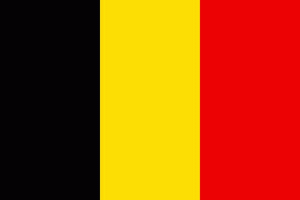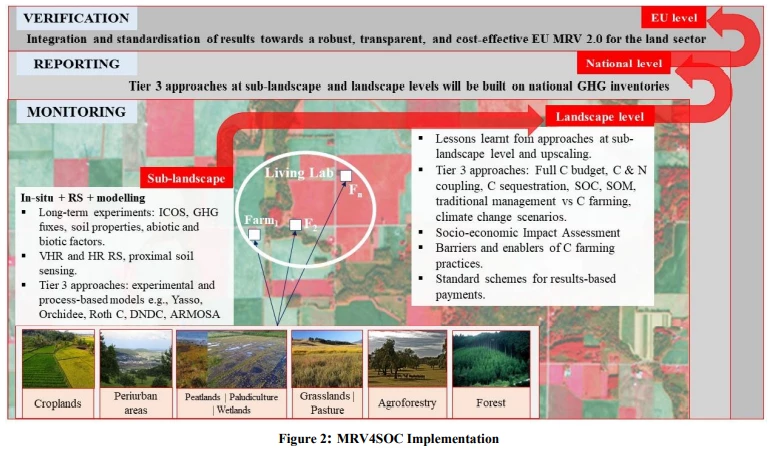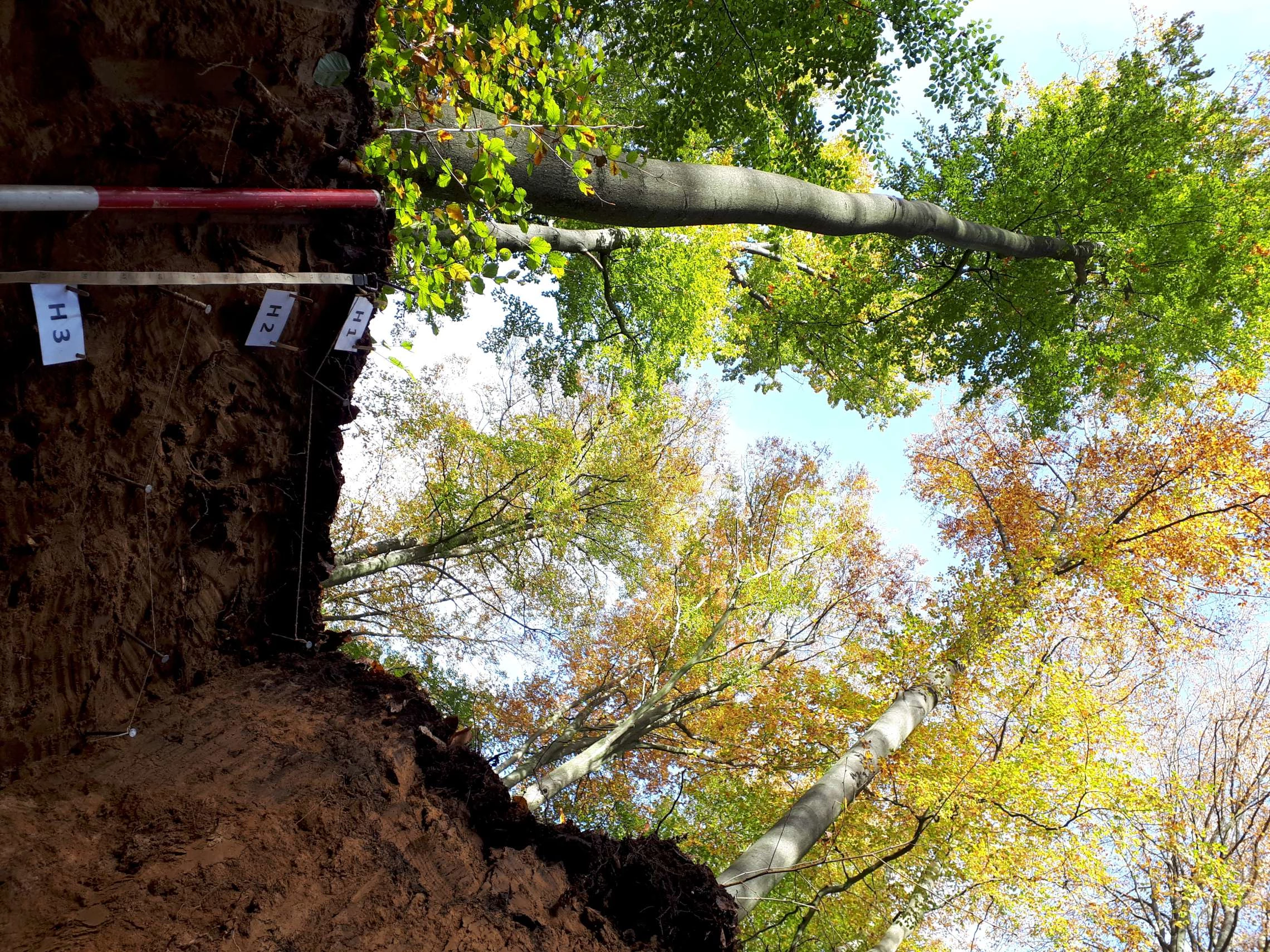Projects
ICOS does not stand alone!
Within the ICOS network we value collaborations between research institutes. In these projects ICOS data and knowledge can contribute in providing a reliable baseline and protocols for greenhouse gas measurements.
For ICOS, the participation in external projects helps us to be a cutting-edge research infrastructure. Discover below the ongoing and past research projects in which ICOS Belgium research institutes participated.
Current Projects
AgroFlux (BELSPO, BRAIN 2.0)
AGROFLUX aims at exploiting recent advances in instrumentation and data assimilation to help solving a longstanding issue of flux-tower site which is the systematic underestimation of gas fluxes for specific atmospheric conditions due to sub-mesoscale transport processes generated by surface heterogeneity. The objective is to provide correction procedures to improve the assessment of the GHG budgets performed over the different types of agrosystems. LIDAR and drone systems with optimal flight planning will be used for spatially-distributed air velocity measurements and air temperature and CO2 concentration measurements, respectively. These data will be combined with turbulence-resolving microscale data-assimilation methods of flow and flux measurements, developing the next generation of flux reconstruction methods at the microscale level. The project will develop and validate these new methodologies maily using an extensive measurement campaign at the ICOS site in Lonzée.
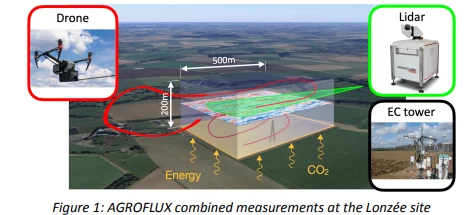
Project timeline: 2023 - 2027
PI: B. Heinesch (Ulg) &
B. Longdoz (ULiege) &
P. Chatelain (UCLouvain) &
Johan Meyers (KULeuven) &
Q. Laffineur (IRM)
GEORGE (H2020)
Sustained, long-term in situ observations are, therefore, crucial to better understand and predict the impact of climate change on ocean ecosystems, increase resilience and develop sound mitigation and adaptation strategies. Furthermore, long-term sustained in situ ocean observations are required to support environmental and climate policies, such as the European Green Deal, and related policies aiming to reach net zero carbon and achieve a sustainable blue economy. To meet this challenge, GEORGE will advance the global technological competitiveness of European ocean observing research infrastructures (EMSO, ICOS, Euro-Argo) through the development and demonstration of a state-of-the-art biogeochemical, multi-platform observing system for characterisation of the ocean carbon system. GEORGE will advance the technology readiness level of novel sensors enabling for the first time systematic autonomous, in situ seawater CO2 system characterisation, and CO2 fluxes on moving and fixed platforms.
Project timeline: 2023 - 2026
PI: T. Gkritzalis (VLIZ) &
Katrina Exter (VLIZ) &
Marc Portier (VLIZ)
Lifting the Yangambi Biosphere reserve into a climate & biodiversity Centre of Excellence (UNESCO)
The project aims to turn Yangambi Biosphere Reserve into a hub for climate and biodiversity monitoring over the next 18 months.
MRV4SOC - Monitoring, Reporting and Verification of Soil Organic Carbon and Greenhouse Gas Balance (HORIZON EUROPE)
MRV4SOC aims at designing a comprehensive, robust, and cost-effective Tier 3 approach, accounting for changes in as many C pools as possible, to estimate GHG and full C budgets, couple C and N cycles, quantify Soil Organic Carbon (SOC) accumulation, and assess the results of traditional management practices and C farming. It seeks to develop solutions applicable for different spatio- temporal scales and climate change scenarios and validated for a wide variety of ecosystems in arid, temperate, and continental climate zones in collaboration with local stakeholders. 14 Demonstration Sites (DS), including BE-Lon, BE-Dor and BE-Wes and spanning 9 land use/ land cover classes will be used for that purpose.
Project timeline: 2023 - 2026
PI: B. Heinesch (Ulg) & B. Longdoz (Ulg) & I. Janssens (UAntwerpen) & 18 other partners
DAMOCO - Closing the DAta gap to develop Land Surface MOdels for COngo Basin forests (BELSPO)
The general ambition of this project is to contribute to closing the Congo Basin forest data gap and improve Land Surface Models to capture its biodiversity and carbon dynamics. To reach this ambition, we will first collect new data on permanent forest inventory plots scattered across the Congo basin. The data will span multiple time scales by combining four different methodological approaches: (i) eddy-covariance data from CongoFlux (an ICOS ESFRI station) will provide (sub-)daily measurements of carbon and water fluxes; (ii) repeated tree measurements will reveal decadal-scale changes in the carbon balance, (iii) measuring a wide array of tree traits on the plots will allow in-depth analysis of decadal-scale changes in taxonomic and functional composition, and (iv) identification of radiocarbon dated fossil charcoal will reveal century-scale and millennial-scale changes in biodiversity. By themselves, those data will shed light on the short- and long-term resilience of critical Congo Basin forest ecosystem functions. Secondly, we will combine all collected data to parameterize and validate the Ecosystem Demography model (ED2) for the Congo Basin forest. Finally, we will use the newly parameterized and validated model to simulate future dynamics of Congo Basin biodiversity and carbon balance under different emission scenarios.
The Flanders Forest Living Lab (FWO)
The European Green Deal relies on healthy forests to remove carbon (C) from the atmosphere, stabilise the water cycle and provide sufficient biomass for the future bioeconomy. The Flanders Forest Living lab realises a specific breakthrough in the assessment of these crucial ecosystem functions, at spatial scales ranging from the individual tree to the entire forest. The new infrastructure involves an UAV and a set of linked validation sensors. Observations are steered by artificial intelligence, in order to be able to adapt the flight pattern to the fluctuating source area of the flux-tower, and in order to proactively adapt to specific weather patterns and potentially interesting ground-sensor observations.
Project timeline: 2022 - 2026
PI: I. Janssens (UAntwerpen) &
B. Gielen (UAntwerpen) &
M. Roland (UAntwerpen)
VERBE - Towards a greenhouse gas emission monitoring and Verification system for Belgium (BELSPO)
Towards a greenhouse gas emission monitoring and VERification system for BElgium (VERBE) aims to address the need to develop an independent, top-down, temporally and spatially explicit greenhouse gas (GHG) emission monitoring and verification support (MVS) capacity for Belgium in support of government policies. The national MVS will also contribute to the European MVS capacity that is called for in the context of the global stocktake process of the Paris Agreement, the European Union (EU) strategy to reduce GHG emissions, and the Belgian signature of the methane pledge to cut emissions by 30% from 2020 levels by 2030.
Project timeline: 2022 - 2026
PI: M. De Mazière (BIRA) &
B. Gielen (UAntwerpen) &
B. Heinesch (Ulg)
Project website: verbe.aeronomie.be
GreenFeedBack
The overall objective of GreenFeedBack is to enhance our understanding of key processes of the terrestrial biosphere – freshwater – ocean continuum in surface-atmosphere GHG exchange, the connection between them, and the impacts from human pressures. We will primarily focus on enhancing our understanding of the GHG exchange processes, biogeochemical cycles and feedback mechanisms in high latitude terrestrial and freshwater systems, marine shelves and ocean areas and thereby advance the process-based representation of ecosystems in Earth System Models (ESM), allowing for more certain climate change projections from which climate mitigation and adaptation strategies can be evaluated. VLIZ is participating in WP5, in the task involved for GHGs observations in seawater (UW, Autonomous vehicles, Time Series platforms)

Project timeline: 2022 - 2026
PI: Thanos Gkritzalis (VLIZ) &
Wieter Boone (VLIZ)
Project website: https://eu-greenfeedback.com/
BlueCloud2026
Blue-Cloud 2026 builds upon the pilot Blue-Cloud project which established a pilot cyber platform, providing researchers access to multi-disciplinary datasets from observations, analytical services, and computing facilities essential for blue science. Core services delivered are the federated Data Discovery & Access Service (DD&AS), the Virtual Research Environment (VRE) and Virtual Labs. The VLIZ ICOS group is participating in the Virtual lab demo on the use of Carbon data in coastal biogeochemical modelling

Project timeline: 2022 - 2025
PI: Patricia Cabrera (VLIZ) &
Gert Everaert (VLIZ) &
Thanos Gkritzalis (VLIZ)
Project website: blue-cloud.org
The Plant Water Pump (Horizon-Europe)
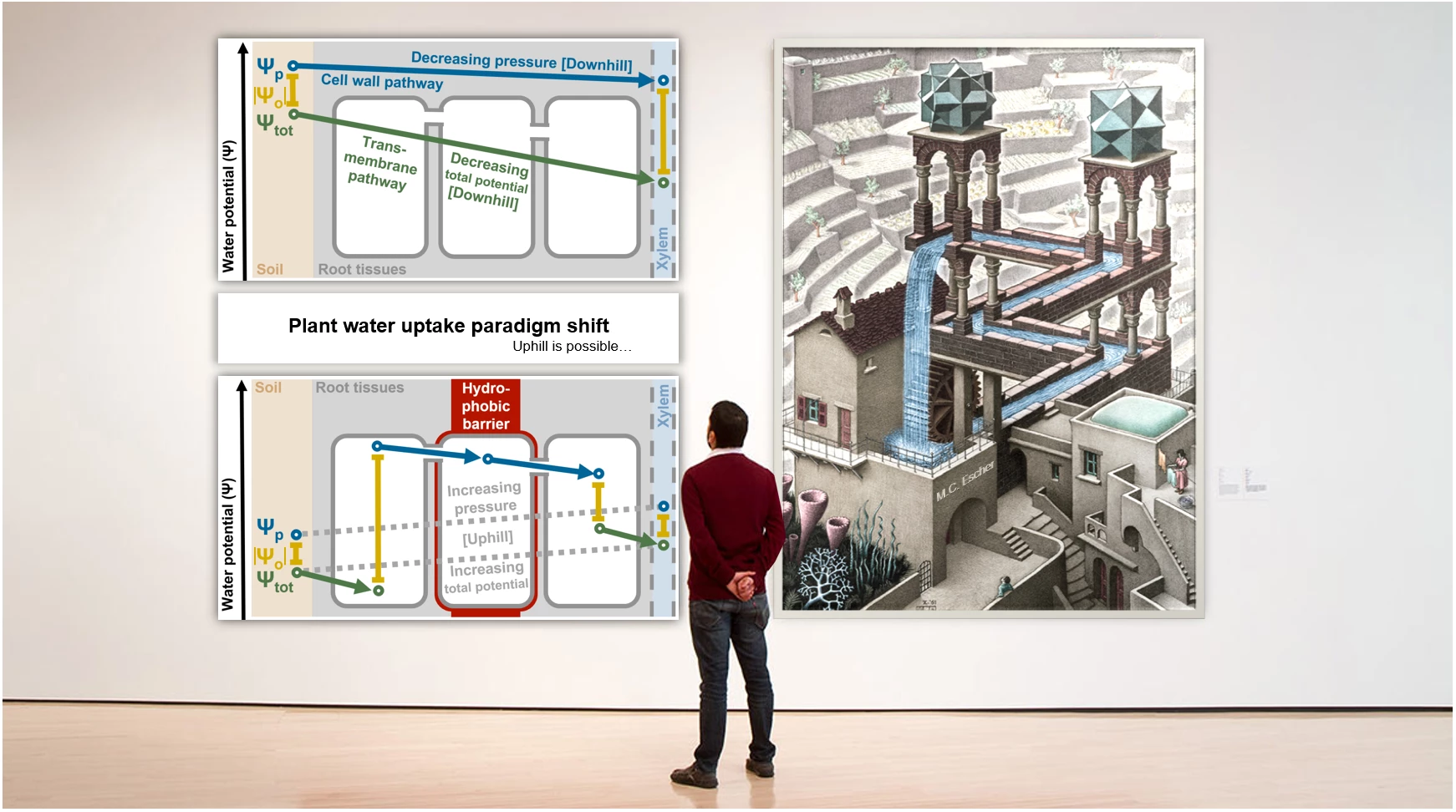
This project seeks to explore the extent to which vascular plants may actively pump soil water without loading solutes into their vascular system, how diverse are water pumping and hydraulic traits across a diversity panel of major crops and trees, and improve predictions of plant water status under drought with simple hydraulic functions compatible with land surface models. By creating a continuous hydraulic framework between plant cell and land surface processes, this work will catalyse future multi-disciplinary multi-scale research encompassing plant physiology and ecohydrology.
Project timeline: 2022 - 2026
PI: V. Couvreur (UCLouvain) &
C. Vincke (UCLouvain)
ICOS-BE
This project supports the operation of ICOS stations by Belgian federal research institutes and aims at initiating collaborative work between the three ICOS components in Belgium.
The particular objectives are:
- to extend ICOS-compliant and TCCON data sets of greenhouse gas (GHG) near-surface concentrations and total column abundances, resp., at the ICOS class 2 atmospheric station of the Ile de La Réunion;
- to provide ocean data based on an improved and fully operational Autonomous Underway Measurement System (AUMS) onboard the new Research Vessel (RV) Belgica, and to label the RV Belgica as an oceanic class 2 station;
- to implement innovative collocated GHG atmospheric concentration and GHG flux measurements, during a test campaign at a Belgian ecosystem site, and later at the Congoflux tower ecosystem site in Congo, with the perspective of long-term operations;
- prospecting for the implementation of atmospheric GHG measurements onboard the RV Belgica;
- Transmission of knowledge to the younger generation and to Congolese scientists, through training of young technicians and a (preferably African) PhD student in ICOS operations;
All data will be disseminated via the Carbon Portal, Belgian Marine Data Centre and international data centres, and project results will be communicated to the research community and stakeholders.
Project timeline: 2021 - 2026
PI: M. De Mazière (BIRA) &
Koen Parmentier (KBIN) &
H. Verbeeck (UGent)
Project website: ICOS-BE
ICOS Cities – Greenhouse gas measurements in urban areas (H2020)
Urban areas contribute to a large share of global and European fossil fuel emissions - cities are therefore at the heart of emission reduction efforts. The ICOS Cities project is a four-year European Union’s Horizon 2020 project that aims to develop a systematic greenhouse gas measurement system for urban areas.
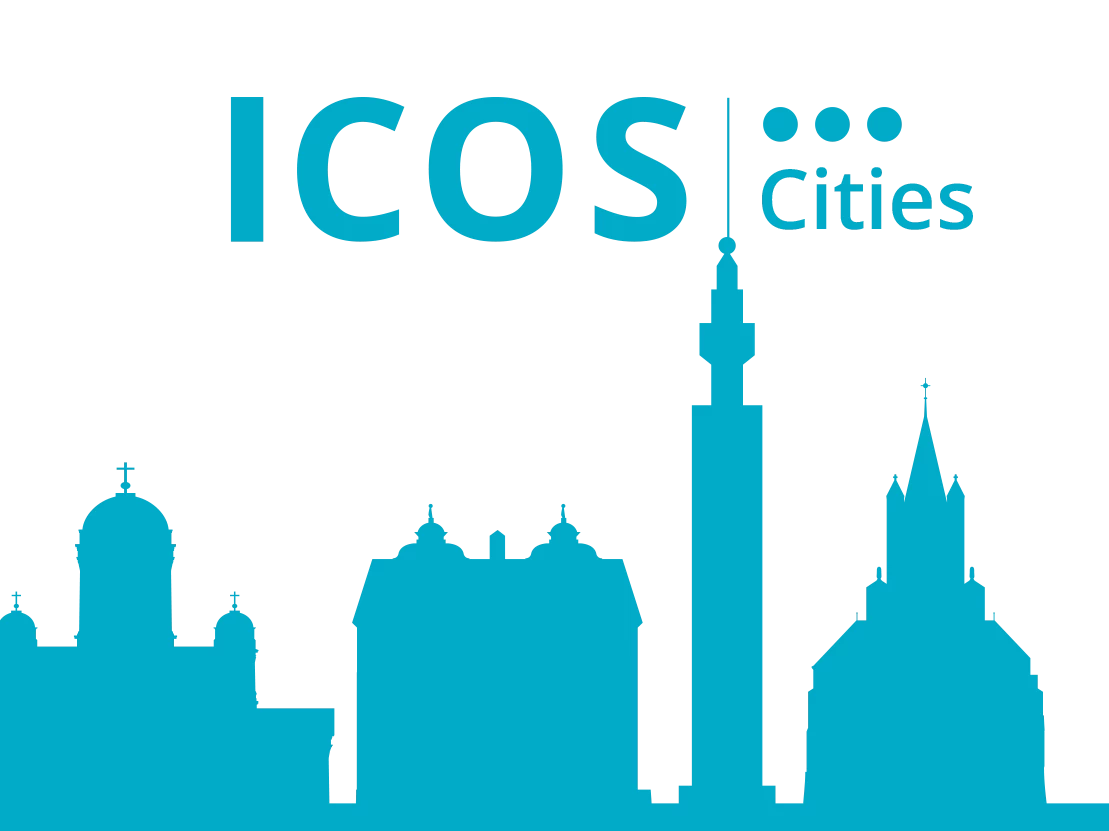
TREE4FLUX
The TREE4FLUX project will support the participation of the Wood Biology Service of the Royal Museum for Central Africa (RMCA) in the UGent-led eddy covariance (EC) CongoFlux tower located in Yangambi (D.R.Congo). The first ambition of TREE4FLUX is to complete the labelling process for CongoFlux and subsequently maintain the label of associated station in the Integrated Carbon Observation System (ICOS), by generating the first continuous multi-annual series of greenhouse gas (GHG) fluxes measured above African old-growth rainforest. A second ambition is to tackle the shortcomings inherent to the ‘top-down’ EC approach, by capitalising on combined RMCA and UGent expertise to develop, consolidate and structurally organise ‘bottom-up’ tree monitoring infrastructures in and around the CongoFlux footprint (the area actually monitored by the EC equipment). These infrastructures will consist of three types of permanent forest inventory plots (intensive, large-scale and geographically dispersed) and the in situ RMCA-led Yangambi wood laboratory. The bottom-up data will be used to validate, complement and strengthen top-down CO2 flux data and will be uploaded as ancillary data to the ICOS carbon portal, which will firmly anchor the position of the combined infrastructures within ICOS.
Project timeline: 2021 - 2025
PI: W. Hubau (UGent) &
P. Boeckx (UGent) &
H. Verbeeck (UGent) &
M. Bauters (UGent) &
Wood Biology Service of the Royal Museum for Central Africa
Improving Available Water Capacity characterization of Walloon Forest Soils (Action 1.4b of 5 year Forest Research and Vulgarisation Plan of the Walloon Region)
In the frame of increasing frequency and intensity of drought stress, decline and mortality risk of forest ecosystems are of concern. This research seeks to make progress on the quality of the prediction of Soil Available Water Capacity (SAWC) of forest soil by taking better account of fine earth and stoniness properties, from field and laboratory measurements and modelling. We dug and sampled 11 soil pits down to 2m deep in Walloon forest soils from the Ardennes, including the Vielsalm ICOS site. A reference database of retention curves and soil property measurements for selected forest soils down to 2 m depth is being established.
The study is part of the "Risk assessment and forest management in the context of global change" component of the Five-Year Forest Research and Vulgarisation Plan (2019-2024) of the Walloon Region, Department of Nature and Forests (DGO3, SPW).
Project timeline: 2019 - 2024
PI: A. Doat (UCLouvain) &
C. Vincke (UCLouvain, PI Vielsalm) &
M. Javaux (UCLouvain) &
H. Titeux (UCLouvain)
Past Projects
CCVS - Copernicus Cal/Val Solution (H2020)
Copernicus Sentinels are a new family of missions including a range of technologies, such as radar and multi-spectral imaging instruments for land, ocean and atmospheric monitoring, providing robust data. The objective of this two year project is to define a holistic solution for all Copernicus Sentinel missions and to overcome current limitations of Calibration and Validation (Cal/Val) activities.

Project timeline: 2020 - 2022
PI: B. Gielen (UAntwerpen) &
M. De Mazière (BIRA)
Project website: ccvs
Forest Flow – (BELSPO)
Quantify dissolved organic carbon export from deciduous and coniferous forest, and hereby close ecosystem carbon balances in two Belgian ICOS-sites - Quantify the seasonality in dissolved vs. gaseous carbon export from forests: tree phenology and rain regime are hypothesised to be the main control factors - Investigate whether shifts in gaseous vs. dissolved carbon export occur during rain events and persistent drought - Model future alterations in the forest carbon balance, by implementing the results in coupled climate, hydrological and forest ecosystem biogeochemical models.
Project timeline: 2017 - 2020
PI: I. Janssens (UAntwerpen) &
C. Vincke (UCL)
RINGO - Readiness of ICOS for Necessities of Integrated Global Observations (H2020)
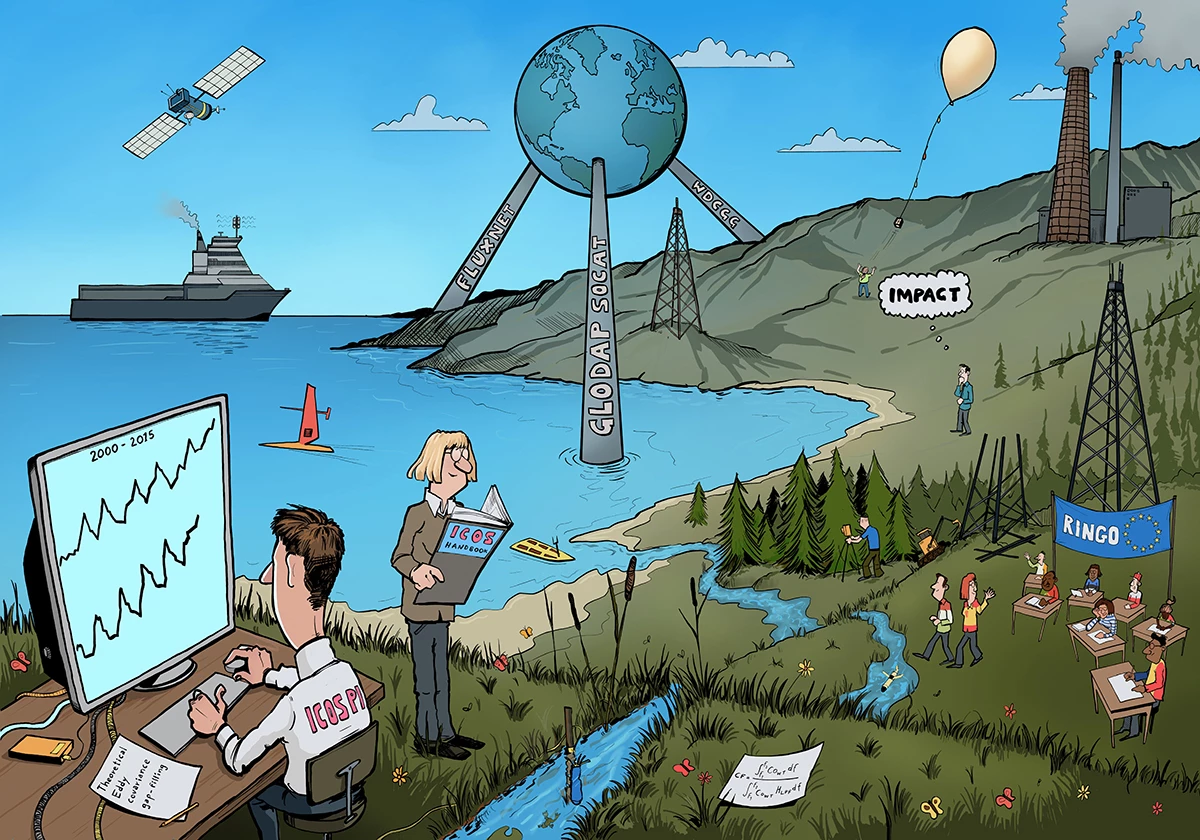 Picture by Sebastian Dahlström
Picture by Sebastian DahlströmRINGO has been a four-year European Union’s Horizon 2020 project that supported the development of the Integrated Carbon Observation System (ICOS), a Landmark Research Infrastructure in the European Strategy Forum on Research Infrastructures (ESFRI) roadmap. Specific tasks for the Belgian partners involve the Integration of Total Carbon Column Observing Network TCCON in ICOS as well as the potential of using Terrestrial Laser Scanning for improved estimation of aboveground biomass in forests.
Project timeline: 2017 - 2020
PI: B. Gielen (UAntwerpen) &
M. De Mazière (BIRA)
Project website: RINGO
BERTRAC (BELSPO - FED-tWIN)
The BERTRAC research profile proposal focus on important aspects of the surface/atmosphere exchange of non-methane biogenic volatile organic compounds (BVOCs), ozone (O3) and reactive nitrogen (mainly NOx), a triad of (families) of reactive trace compounds which are closely linked in tropospheric chemistry. The research investigates (i) the processes that contribute to the net ecosystem-scale fluxes of those reactive trace gases, (ii) the driving parameters of those exchanges, (iii) the impact of management practices on the exchanges and finally (iv) the impact of the exchanges on ecosystem services. Field activities make the best use of ICOS ecosystem stations (e.g. BE-Vie in 2022 and 2023) and this project enhances collaborations between the ICOS and ACTRIS communities.
Project timeline: 2022 - ...
PI: B. Heinesch (ULiege) &
C. Amelynck (BIRA)
